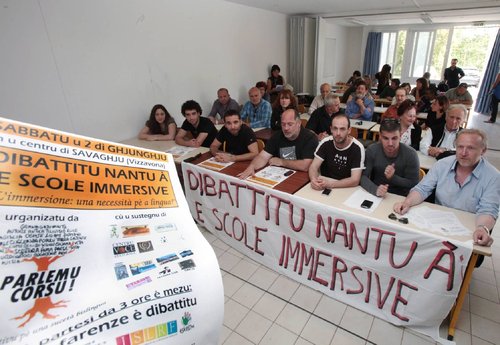PASCAL OTTAVI
University of Corsica (Pascal Paoli).
In this article written for NAZIOGINTZA and ICEC (https://www.icec.ngo/), University of Corsica professor Pascal Ottavi reports on the situation of the Corsican language in the island’s schools.
The “Corsican language” has not always been labeled as such. This situation is due in large part to historical reasons. Essentially every language – official or not – has evolved and varied, whether for geographical reasons or for social distinctions. Corsica is no exception to this rule: lacking a common standard, its variants show noticeable differences in terms of phonology and a remarkably unique syntax. This allows for total shared understanding across the island, from North to South, contrary to what occurs in neighboring Sardinia, for example.
Long recognized as part of the Italo-Roman area
Corsican is a language made up of the sum of its diversity. Like all Roman languages, it comes from the fusion of Late oral Latin – from the Late Empire and a native vernacular language. The toponymy is rich with pre-Latin terms, while common nouns like “tafone” (hole) or “caracutu” (holly) are marks of a non-Latin linguistic affiliation.
Defining modern Corsican
From a structural linguistic perspective, we can identify the language as a mix of dialects from Late Latin and affiliated with the Italo-Roman area. From a sociolinguistic point of view, it would be labeled as a neo-Latin language, typical of the will of the Corsicans to effectively name it as a specific entity and declare it to be different from all others, especially from Italian. In fact, this occurs alongside the process of creating their autonomy: on the one hand through de facto historical and cultural separation from the Italian area, and on the other hand through a process of linguistic development (literature, grammar, dictionaries, lexicon).
An illegitimate child born from French
Corsican gained its independence from Italian, the historical language of the island’s culture in the mid 19th century, when French was starting to be imposed as the language of elite education, and then continued as the tool for literacy among the population. Deprived of the linguistic continuity with Italian, the language was forced to come out of its dialect status, in order to continue to exist. Even more so with the progress of public education which forced integration with France. The state was anxious to eradicate Italian, French having become the language of the elite class then tended to take root in the traditional uses of the vernacular. Therefore, we can assert, without risking paradox, that the Corsican language is the illegitimate, surprise child of the imposing of French on the island.
A polynomial language
Corsican is a polynomial language: it is made up of the sum of its dialects, which its speakers recognize and deem legitimate. Thus, it is a language of several standards. These include the grammatical recognition of the principle of variation, which is natural in social norms but of which the official standard has historically had to fight for survival. This plurality is recognized in schools and in the media by the regional government, the Collectivité Territoriale de Corse.
The current vitality of the Corsican language
It seems quite difficult to obtain an exact number of speakers of the language. In France, ideologically and institutionally speaking, there are only French citizens who speak the language exclusively.
The Collectivité Territoriale de Corse ordered a linguistic survey among 1500 people in July 2021. The results of which indicate that approximately 39% of the population are active speakers and that 70% of people surveyed support the demand for co-official languages on the island (French and Corsican) based on the models of Basque and Catalan.
Current status of Corsican taught in schools
Only the results from the 2020-2021 school year are available for publication at this time. Indeed, the Corsican school district has released no further official data since that date. It must be noted that every five years the French government and the Collectivité de Corse sign a plan to develop the language. Since 2015, when the Corsican nationalists gained executive power, the plan has contained a widespread bilingualism training program for high school and middle school teachers of non-linguistic subjects (history, mathematics, physics…).
In elementary schools, 97% of children learn Corsican on a more or less regular basis; 45% attend bilingual classes and about 2% attend an immersive classroom. In middle schools, 55% of students learn Corsican as a second language (like a second “foreign” language) and 25% are part of a bilingual class throughout their curriculum, which is actually more theory than fact. Lastly, in High Schools, the numbers are around 14% of students who take Corsican as a foreign language option, while bilingual courses are almost non-existent. The Baccalaureate exam reform headed by the then Minister of Education, Michel Blanquer, did some significant damage to the teaching of so-called ‘regional languages’. And Corsican was one of them, even if, for the moment, the consequences are less devastating on the island than to others on the mainland.
Wich strategy pays off?
For forty years now, the nationalist movement’s strategy has been to favor public education, given the initial weakness of the nonprofit sector. This choice was supported by the successive nationalists in office at the Corsican Assembly, and has produced significant results. Indeed, the above data show the extent of the positive outcome.
However, we are up against the limits of the system, which allows no real sovereignty for the elected officials of the island. Therefore, new initiatives such as ikastolas (Basque language school) have attempted to establish immersive education, in addition to the far too slow openings of immersion classrooms or bilingual classes within the public school system.
The discussions begun this past summer on the future status of autonomy for the island will weigh heavily on the progress of the language and its teaching. We remain skeptical of the expected levels of progress, given the overwhelming influence of jacobin ideology amongst the political representatives and the structure of the French government.

